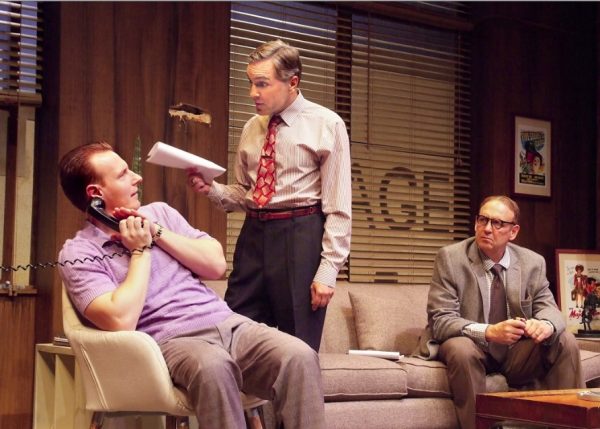
The pulp fiction story by James M. Cain turned into “Double Indemnity,” the 1944 film noir thriller that enraptured audiences with a plot and action that craftily circumvented censorship.
Then, the Hollywood Motion Picture Production Code, the archaic system of censorship governing film making, reigned supreme. How director-screen writer Billy Wilder and his terminally conflicted co-writer Raymond Chandler deceived the split-tongued moralists fires up “Billy & Ray,” the current Laguna Playhouse production written by Mike Bencivenga and directed by Michael Matthews.
As house lights dim, the audience views an elegant office turned dumpster with overturned trash cans spilling wads of typing and carbon copy paper, empty martini glasses littering surfaces and a bamboo cane casually stuck between couch cushions. Kudos to scenic designer Stephen Gifford whose creation of legendary Hollywood director Billy Wilder’s lair lets one imagine the stale effluvia of Chandler’s pipe and the chaos caused by the abrupt departure of Charles Brackett, Chandler’s predecessor.
That pair had begun to attempt turning the Cain novel into a film screenplay. But, Wilder strove to spice up the story of Phyllis, the perfidious wife plotting to murder her husband by seducing an insurance salesman into doing the deed with (cleverly concealed) sex, violence and a final comeuppance. Brackett merely wanted “up-lifting.”
Joe Sistrom (Scott Lowell), the film’s producer, drifts in and out of the plot, initially opposing Wilder’s vision as “odious and disgusting,” but getting on board eventually. Understated but on point, Sistrom frets mostly about censors’ reaction to the film’s premise. “It’s time movies grew up,” retorts Wilder.
Blake Ellis convincingly portrays Wilder, the pugnacious, brilliant and oversexed Austrian when it would have been easy to veer into caricature. Instead, he elegantly pulls off an Austro-Germanic accent and vulgarity-laced Americanisms. (Asked about his linguistic prowess, Ellis said that while developing characters he pays attention to languages, especially dialects.)
Chandler (Nick Searcy) is a perfect match as the rumpled, uptight shlep with a clumsily concealed drinking problem. Wilder catches on and hilariously reveals it by substituting Chandler’s libation, hidden in his briefcase, with mouthwash.
Alas, things turn tragic in the second act, after Wilder entices Chandler to take up the bottle again. Booze, as it turns out, is a driving force in this intellectual and emotional joust between two creative men who appear unable to overcome their differences.
The script’s delving into Chandler’s alcoholism dampens the mood but provides uplift when Wilder finds his own vulnerability mirrored in Chandler’s illness.
In the same timeframe, the stoic manner in which Wilder accepts the annihilation of his family during the Holocaust seems discordant at first. In the same time-frame, the stoic manner in which Wilder accepts the annihilation of his family during the Holocaust, seems discordant at first. It makes more sense when Wilder reveals his processing of events by changing the film’s ending from one where the murderer is condemned to the gas chamber to one where friendship and justice are put to the test.
Bencivenga’s story begins with Brackett’s departure and Wilder mistaking the bespectacled Chandler for an exterminator tasked with slaying office ants. After a short, funny exchange, Chandler convinces Wilder of his credentials as a noted crime novelist while also dismissing the Cain book as “tasteless tripe.” And, even though Wilder dismisses his literate prose as “crap,” Chandler takes the job, lured by the prospect of earning $700 a week when he had only hoped for $1,000 for the entire project.
The story’s first act moves at a fast and humorous clip due to the presence of Helen Hernandez (Joanna Strapp), Wilder’s long-suffering secretary. She cleans up messes, supplies Wilder with martinis, fields calls from studio heads and by lunch arranges time slots for screen room dalliances with aspiring starlets.
Hernandez is picture perfect in her ‘40s wardrobe and displays of barely hidden exasperation and turns of dry wit. Peggy Olson, Mad Men’s secretary turned copy writer comes to mind.
Laguna Playhouse artistic director Ann E. Wareham praised Bencivenga’s and Matthews’ vision and her own excitement at bringing the show to fruition.
Given the show’s content and adult language, it was surprising to see youngsters scampering around the theater on opening night.




